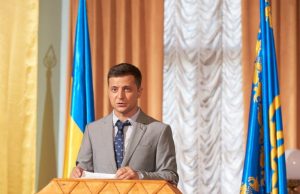The Clear Sky Initiative rallied copyright holders at the conference “Anti-Piracy in Ukraine. What is Done and What to Do”, this time labeled “2018”. The meeting of all those dealing with the intellectual property protection was held on September 19 a part of Kyiv Media Week.
Ukraine can and should follow the creative economy way. Creating own intellectual product, either films, or computer software, or books or TV series stands for generating thousands of high-skilled employments, ecological production, developing arts, attracting funds from abroad.
But when the theft of such products jeopardizes the creative industry development, how to defend it? What should be done, who should do it, what has already been done and, which is most important: what are the short-term tasks? How is this issue regulated by the national legislation? What anti-piracy practices are applied and what is their result? How are our neighboring countries fighting piracy?
Katerina Fedorova, conference moderator and the Head of the Clear Sky Initiative, offered to seek answers by starting talks on how the intellectual property protection issues are covered by Ukrainian laws. She explained what kind of administrative and criminal liability is established for violating intellectual property rights. She also translated the issue into practice: what measures are taken and their results for copyright holders.
“All violations of intellectual property rights refer to private prosecution crimes. That is, we have the right to initiate instituting criminal cases only after the copyright holders applied to us and provided all required documents. Every year we receive a growing number of such applications. High activity for the above violations is observed in Lviv, Kyiv and Dnipro. In 2018, we remitted more than 30 cases to the courts, as well as registered over 100 violations”, as stated by Zaur Urusov, Deputy Chief of Division of the Cyber Police Department.
Vyacheslav Miyenko, Deputy CEO for Legal Issues at 1+1 Media, managing partner of JSC Smartsolutions Law Group, shared the counteraction algorithm: “We have defined three key points to construct an effective anti-piracy strategy: a regular monitoring of violations on the market, a comprehensive solution for the protection of rights, combining advanced technologies and lawyers’ expertise, as well as proactive coordination of actions of copyright holders and the working group throughout all phases until the final dispute settlement”. Among the instruments of struggle, he called the initiation of criminal and administrative cases, blocking access to content on the Internet, blacklists, appeals to state institutions.
Nikolai Faengold, Chief Commercial Officer at StarLight Digital, stressed in turn: “We are fighting against thefts and thieves. As for pirates, thieves are businessmen who are doing a high-margin business, since they pay nothing to the content producer. We are fighting for fair and equal make-money conditions. We already have an algorithm for protecting our intellectual property rights applying tried-and-tested schemes. Other copyright holders do not have to reinvent the wheel, since we are open to share our experience, information, guidelines. Our recent success is 27 cases in the Unified Register of Pre-Trial Investigations (ERDR), in the matter of 5 of them there were carried out searches, 6 cases were submitted for examination and 1 case has already been submitted to the court.”
Vladimir Iling, President of the Ukrainian Anti-Piracy Association, spoke about the activities and progress, especially in camcordering: “We treat Internet piracy, illegal show of films and camcordering as the main piracy challenges. In 2018, we succeeded in shutting down 51 websites, replacing 42 hosting services and closing 10 cinemas. Moreover, a camcorder was detained for the first time ever and the penal proceedings were opened under Article 176 of the Criminal Code.
Victoria Tsomaya, Chief Marketing Officer at VOLIA, was the first who answered the question about “the way of business’ supporting copyright holders, the transformation of technologies and formats of content consumption, its impact on the market and protection of intellectual property rights”. She remarked that: “Until the economy begins to earn, the thefts will remain. However, the copyright holders are also required to revise their pricing policy. If we look at the segments, where the copyright holders have already done it, then we notice almost complete piracy’s disappearing.”
Aleksey Krasyuk, Deputy Chief Operational and Information Security Officer at Ukrainian Interbank Association EMA spoke about prospects for cooperation between copyright holders and banks: “Within the joint project of EMA and Clear Sky Initiative, it is planned to work out a procedure to notify banks and payment services that payments for illegal content arrive in their customers’ accounts. Since this activity is prohibited, the financial institutions will get a tip for suspending cooperation with such a client. The EMA unites most of Ukrainian banks and financial institutions operating in the payments market, so the project has promising outlook.”
Another anti-piracy aspect is to block ads about illegal services, as stated by Andrey Bichuk, lawyer for online advertising service OLX. “OLX is a global international brand. Therefore, the company cannot stand aside and be part of the pirate ecosystem. We respond promptly to all requests and try to provide equal conditions for users to meet the global goal for everyone to win in the future.”
The panel discussion on alternative anti-piracy activities was inaugurated by Dmitry Levin, Head of Content Monitoring Center at StarLight Digital (STB, Novy Channel, ICTV and others). “Recently, we have removed or blocked 29 online broadcasts of our TV channels, 7 applications for Google Play and the AppStore, 762 ads on OLX, 4 announcements about the sale of STB and 2 official Facebook groups of OTT pirates, 61 playlists, 87 ForkPlayer installation videos. Our expertise already includes 19 success cases of blocking payments of intellectual property rights violators in cooperation with Visa and MasterCard payment systems. We are also proud of new advances with Instagram and the start of cooperation with Infomir.
Andrey Bakhtalovsky, Product Owner of the SUDUM Content Monitoring Software, and Anna Andryushchenko, Project Managing Director at Kinolife Distribution, spoke about joint success in fighting against illegal distribution of films and the SUDUM efficiency. According to Anna, “The most crucial problem is the high piracy rate on the Internet, as well people’s unwillingness to pay for content. Due to our investment in advertising, we automatically advertise pirate websites, codes and go round in a circle. However in 2018, SUDUM helped us to remove 27.022 illegal video copies, to remove 9.141 sites from Google search and block 50 websites that used questionable corporate identity to advertise dubious goods and services.”
During the closing part of the conference, Marta Sulkiewich, Gemius Product Sales Officer for EMEA&APAC, shared her observations on the development of paid services in Poland, citing the legalization of a pirate service, which already has about 100.000 subscribers and legally makes money. Marta also mentioned the company’s research on websites put on blacklists.org, where you can quickly identify advertising on the websites that violate copyright holders’ rights. Since advertising happens to be placed on such websites due to technical errors or unfair partners, there is a special email notification option that helps to promptly handle the situation and escape consequences. The result for the Ukrainian Internet audience is a list of top-10 pirate resources.
Aleksey Shuldeshov, Producer of the Star Media Film Company, focused in detail on the specific copyright holders’ losses and calculations of losses on YouTube, in digital, contracts with TV majors, as well as losses on the global market: “We have more than 5.5 thousand hours of our own content and more than 350 titles subject to protection. Therefore, we created our own content protection unit to avoid profit losses in digital, reducing losses under contracts with major TV market players, reducing the product value and reputational losses.”
In her closing speech Katerina Fedorova spoke about the research of the Internet audience of Ukraine, conducted by Gemius exclusively for the Clear Sky Initiative: on the most visited resources; on Ukrainians’ eagerness to buy access to content, and on their knowing difference between a pirated video and the legal one. As a result, users most often watch videos online (50%), and the legal ones can be identified by 34% of users, while as many as 89% of them welcome anti-piracy. At that, only 14% are eager to pay, and some 7% do pay today.
“The damage from piracy is huge. However, the business capabilities due to anti-piracy are none the worse. So what to do? Unite, exchange expertise, act individually and simultaneously, make use of recommended suggestions of the Clear Sky Initiative members”, as Katerina Fedorova, Head of the Clear Sky Initiative, summed up, encouraging everyone to join partnership.

















